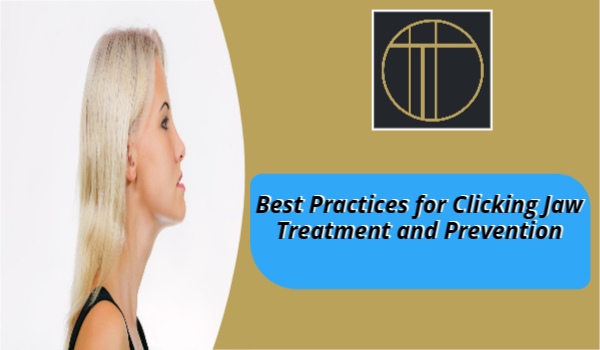Introduction
Clicking jaw, also known as temporomandibular joint (TMJ) disorder, is a common condition affecting the joint that connects your jaw to your skull. It can cause a variety of symptoms, including pain, clicking or popping sounds, difficulty opening or closing your mouth, and headaches.
Understanding the Causes of Clicking Jaw
The exact cause of clicking jaw is often unclear. However, several factors can contribute to its development. These include:
- Injury: Trauma to the jaw, such as a blow to the face, can damage the joint and surrounding tissues.
- Arthritis: Conditions like osteoarthritis or rheumatoid arthritis can inflame the TMJ and cause pain and stiffness.
- Misalignment: Misalignment of the teeth or jaw can put excessive stress on the joint.
- Grinding or clenching: Habitual teeth grinding (bruxism) can wear down the teeth and put strain on the TMJ.
- Stress: Stress and anxiety can lead to unconscious jaw clenching or grinding, which can worsen TMJ symptoms.
Clicking Jaw Treatment Options
If you are experiencing Clicking Jaw Treatment, it is important to consult with a dentist or oral surgeon. They can properly diagnose the underlying cause and recommend the most appropriate treatment. Some common treatment options for clicking jaw include:
- Conservative measures: These may include over-the-counter pain relievers, applying ice packs to the jaw, and avoiding hard or chewy foods.
- Oral appliances: Custom-made mouthguards can help to prevent teeth grinding and reduce stress on the TMJ.
- Physical therapy: Exercises and stretches can help to improve jaw mobility and reduce muscle tension.
- Medications: In some cases, medications may be prescribed to reduce pain and inflammation.
- Injections: Corticosteroid injections can help to reduce inflammation within the joint.
- Surgery: In severe cases, surgery may be necessary to repair or replace the damaged joint.
Preventing Clicking Jaw
While clicking jaw cannot always be prevented, there are several steps you can take to reduce your risk:
- Manage stress: Practice stress-reducing techniques such as yoga, meditation, or deep breathing exercises.
- Avoid excessive jaw movements: Avoid activities that put excessive strain on the jaw, such as chewing gum excessively or opening your mouth wide.
- Maintain good posture: Good posture can help to align the jaw and reduce strain on the joint.
- Wear a mouthguard: If you grind your teeth, wearing a custom-made mouthguard at night can help to protect your teeth and reduce stress on the TMJ.
- Eat a balanced diet: A healthy diet rich in fruits, vegetables, and whole grains can help to maintain overall health and reduce inflammation.
Clicking Jaw Treatment Guide: From Diagnosis to Recovery
Clicking jaw, also known as temporomandibular joint (TMJ) dysfunction, is a common condition affecting the joint that connects your jaw to your skull. This joint allows you to open and close your mouth, speak, and chew. When this joint becomes misaligned or inflamed, it can produce clicking, popping, or grinding sounds, accompanied by pain, jaw stiffness, and headaches. If you are experiencing clicking jaw, it is crucial to seek professional help from a qualified dentist or oral surgeon.
Diagnosis
At Town Hall Dental, our experienced team will conduct a thorough examination to diagnose the underlying cause of your clicking jaw. This may involve a physical examination of your jaw, facial muscles, and bite. We may also recommend imaging tests such as X-rays or CT scans to get a better view of your jaw joint.
Causes of Clicking Jaw
Clicking jaw can have various causes, including:
- Injury: Trauma to the jaw, such as a blow to the face, can damage the joint and surrounding tissues.
- Arthritis: Conditions like osteoarthritis or rheumatoid arthritis can affect the TMJ, causing inflammation and pain.
- Muscle imbalances: Overuse of jaw muscles, such as from teeth grinding or clenching, can lead to muscle tension and jaw misalignment.
- Bite problems: Misaligned teeth or an improper bite can put excessive stress on the TMJ.
- Stress and anxiety: Emotional stress can lead to unconscious jaw clenching or grinding, which can worsen TMJ symptoms.
Treatment Options
The treatment for clicking jaw will depend on the underlying cause and the severity of your symptoms. Some common treatment options include:
- Conservative measures: These may include:
- Pain relievers: Over-the-counter medications like ibuprofen or acetaminophen can help reduce pain and inflammation.
- Muscle relaxants: In some cases, muscle relaxants may be prescribed to relieve jaw muscle tension.
- Heat or cold therapy: Applying ice packs or warm compresses to the affected area can help reduce pain and inflammation.
- Soft diet: Eating soft foods can reduce stress on the jaw joint.
- Stress management techniques: Relaxation techniques such as yoga, meditation, or deep breathing can help reduce stress and jaw clenching.
- Oral appliances:
- Mouthguards: Custom-fitted mouthguards can help prevent teeth grinding and protect the teeth and jaw from damage.
- Splints: Dental splints can help reposition the jaw and reduce stress on the joint.
- Physical therapy: A physical therapist can teach you exercises to improve jaw mobility, strengthen jaw muscles, and reduce pain.
- Injections: Injections of corticosteroids or botulinum toxin (Botox) can help reduce inflammation and muscle spasms.
- Surgery: In severe cases, surgery may be necessary to repair or reconstruct the TMJ.
Recovery
The recovery time for clicking jaw will vary depending on the severity of the condition and the chosen treatment.
- It is important to follow your dentist’s instructions carefully and attend all follow-up appointments.
- You may need to make adjustments to your lifestyle, such as avoiding hard or chewy foods and practising stress management techniques.
- It is important to be patient and consistent with your treatment plan.
Conclusion
Clicking jaw can be a frustrating and sometimes painful condition. However, effective treatment options are available. If you are experiencing any symptoms of clicking jaw, it is important to schedule an appointment with a dentist or oral surgeon at Town KHall Dental. Early diagnosis and treatment can help to prevent the condition from worsening and improve your quality of life.
Please leave a comment below if you have any questions or would like to share your experiences with clicking jaw.


